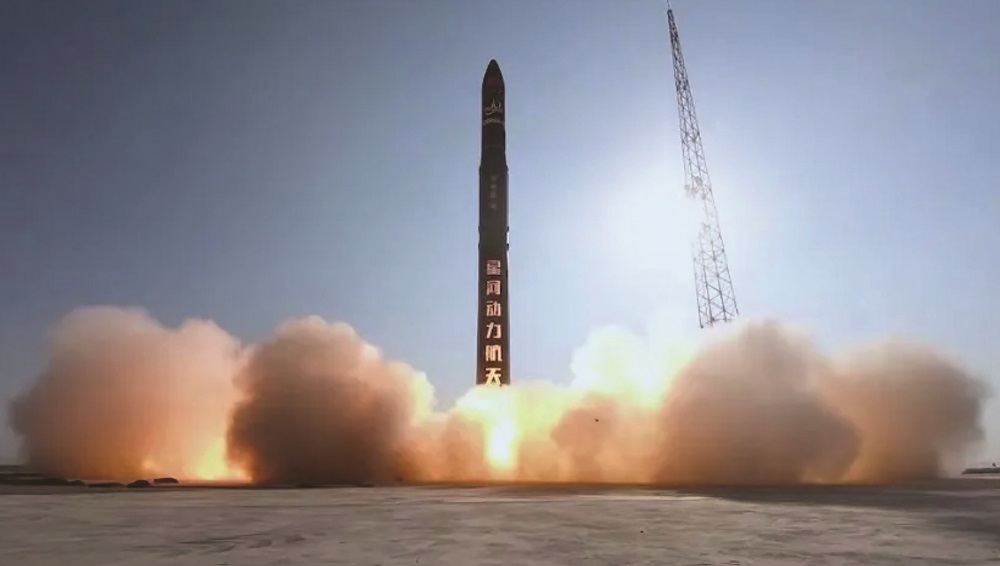HELSINKI — A Chinese startup is aiming to developing spacecraft capable of supplying China’s space station, with a first small demonstration launch set for 2022.
Beijing-based InterSpace Explore signed a deal Aug. 4 with Chinese private launch firm Galactic Energy for launch of the Zengzhang-1 demonstration returnable satellite on a Ceres-1 solid rocket in 2022.
A day later Interspace Explore, full name Beijing Interstellar Development Technology Co., Ltd., raised tens of millions of Chinese yuan (¥6.48 per dollar) from investment firm Innoangel Fund.
The Zenghang-1 (Growth-1) satellite will have a launch mass of around 350 kilograms and return a payload of more than 100 kilograms, according to Chinese media reports.
Interspace Explore founder Fu Shiming, a former employee of state-owned spacecraft maker China Academy of Space Technology (CAST) and a member of the Tiangong-2 space lab project, said at a press conference that spacecraft are essential to human use of space resources and hold huge commercial and military value.
Fu added that the development of spacecraft by private enterprises can supplement the domestic space economy and provide efficient solutions for space resource utilization.
The firm’s current research and development focus is on low-cost small cargo spacecraft. Fu also identifies potential customers in pharmaceutical and space breeding companies.
The cooperation agreement with Galactic Energy came a day after the failure of the iSpace Hyperbola-1 solid rocket. Galactic Energy plans two Ceres-1 launches in the coming months.
Missed this last week: A spacecraft company named Beijing Interstellar Development Technology Co., Ltd. (InterSpace Explore) raised funding AND signed strategic cooperation with Galactic Energy inc. launch of returnable spacecraft ZengZhang-1 on a Ceres-1. https://t.co/2gE2LIvF0C pic.twitter.com/sUvFdaEBjI
— Andrew Jones (@AJ_FI) August 11, 2021
Chinese commercial cargo
The development is an apparent response to a January call for proposals issued by China’s human spaceflight agency, CMSA, soliciting low-cost cargo transportation solutions for the Chinese space station. The announcement was the first indication that the national space station project would be opened to involvement of commercial companies. The move can be seen as similar to earlier NASA commercial cargo initiatives.
The main requirements for cargo delivery include a payload capacity of 1-4 tons, the possibility for removing and deorbiting station waste to prevent space debris, and transportation costs to be inline with international levels. For returning cargo to Earth, requirements are for a payload 100-300 kilograms with the returning spacecraft to be easily tracked and recovered.
The scheme aims to supplement the large Tianzhou cargo delivery system and build a “flexible, efficient, diverse, and low-cost cargo transportation system.”
The large, 13,000-kilogram Tianzhou spacecraft are the only spacecraft China has for delivering cargo and propellant into low Earth orbit for its space station. A Long March 7 rocket is currently on its way to Wenchang, Hainan island to launch the Tianzhou-3 mission in mid-late September ahead of the Shenzhou-13 crewed mission.
Space Pioneer, a Chinese launch startup, noted space station supply missions as an ambition in closing a funding round last month.
China has a range of experience including retrievable Fanhui Shi reconnaissance satellites which utilized impregnated oak to survive reentry. The country also successfully delivered lunar samples to Earth with Chang’e-5 last December.
CAST has been developing a returnable spacecraft named Space Workshop, previously slated for launch in 2020-2021. In 2016 China launched the Shijian-10 retrievable satellite which facilitated a range of experiments in space life science and more.
China’s national strategy of military-civilian fusion is understood to help facilitate the transfer of technologies for commercial use and has been a factor in the rapid development of China’s nascent commercial space sector.
